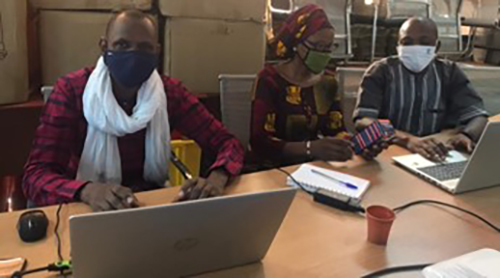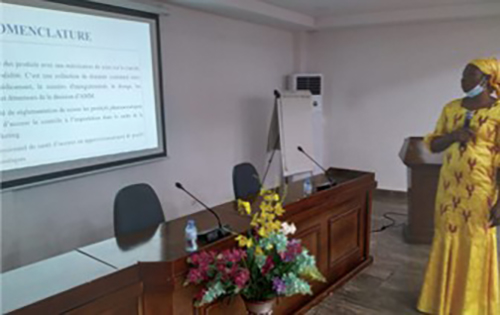Enabling better access to good quality essential drugs for women and children in Mali
Enabling continuous access to quality medicines is one of the essential elements of a robust pharmaceutical system. Since 2019, Mali has been facing many challenges, including the lack of a swift follow-up for marketing authorization applications and non-availability of a nomenclature for essential drugs online, due to a power outage affecting the Directorate of Pharmacy and Medicines (DPM) server in 2019, which led to the loss of all the data available in the Pro-E-Med software, which is used to gather data related to pharmaceutical product approval. As a result of this loss, Mali suffered severe setbacks in its effort to update thousands of drug references, including those for maternal, newborn, and child health (MNCH)–related drugs.
This situation has had repercussions on the availability of and access to quality medicines in Mali. Sadia Korkosse, a veterinary engineer at the DPM, explained, “Importing medicines without a marketing authorization is a risk because we have no information about these medicines.”

Searching for and entering product information in Pro-E-Med. Photo credit: Sonia Koba Ananani, Pharmacy intern
The US Agency for International Development (USAID) Medicines, Technologies, and Pharmaceutical Services (MTaPS) Program has supported the DPM in resolving some of the key challenges to improve the availability of quality medicines in the country.
With regard to Pro-E-Med, while the DPM’s IT managers stabilized and protected the software, MTaPS trained the agents responsible for data entry between December 21 and 23, 2021, so that they could better understand the drug authorization process in Mali, as well as the Pro-E-Med software itself, ensuring that they would have all the tools they needed to update the database. All the authorization files whose processing had been delayed could then be registered in the software.
Additionally, a daily follow-up was carried out by the data entry supervision team, which comprised the Head of the Regulatory Division, the MNCH Advisor for MTaPS, and the DPM computer engineer, to verify the information and correct any errors observed in the data.
After Pro-E-Med was updated, a nomenclature consisting of 3,606 medicines authorized in Mali was published in May 2022, enabling all MNCH drugs registered in Mali to be found in the database, including 63 hyaluronic-based, 50 ciprofloxacin-based, and 3 vitamin K1-based drugs.
In addition to putting Pro-E-Med back into operation to recreate the nomenclature, it was necessary to give the appropriate information to the stakeholders who would use this list. Potential stakeholders such as customs officers or veterinarians with access to it did not actually know how to use it. To overcome this challenge, on May 30, 2022, the DPM and MTaPS organized a refresher training for stakeholders in the health system to explain how to use it for the specific needs of health programs and for post-marketing surveillance activities.

Presentation of the nomenclature by Dr. Aminata Konaté. Photo credit: Ousmane Traoré, Senior Technical Advisor, USAID MTaPS
This whole process represents a true revolution in terms of time saving for all stakeholders, considering that before Pro-E-Med was put back into operation, it took between one and two months to prepare the nomenclature. With the software working again, the nomenclature can be extracted at any time by stakeholders who are adequately trained to use the complete list of drugs registered in Mali.
Expressing his satisfaction with the work that has been done, Sadia Korkosse went on to say, “Prior to this dissemination workshop, copies of the nomenclature were sent directly to users. This dissemination workshop has allowed users of the document to familiarize themselves with this tool and be able to use it better. This training meeting will also enable all stakeholders in the pharmaceutical field to ensure a supply of quality medicines throughout the country.”